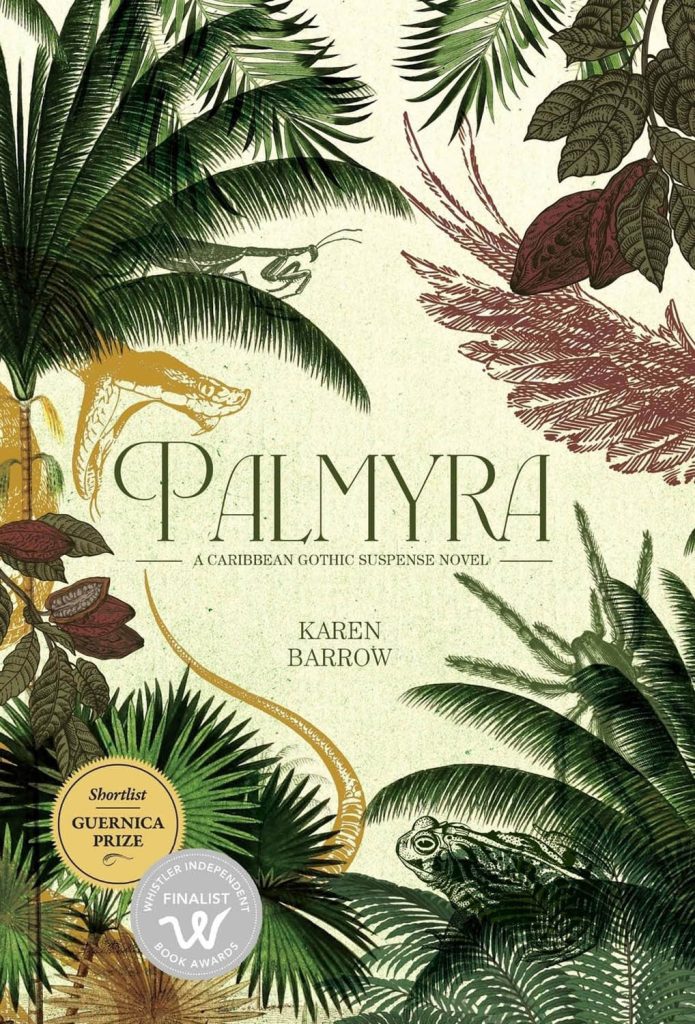This month’s reading picks from the Caribbean, with reviews by Shivanee Ramlochan of Palmyra by Karen Barrow; Resistance, Refuge, Revival: The Indigenous Kalinagos of Dominica by Lennox Honychurch; The House of Plain Truth by Donna Hemans; and West of West Indian by Linzey Corridon
Palmyra
by Karen Barrow (Friesen Press, 330 pp, ISBN 9781039195813)
Lush and craftily constructed, this Gothic suspense novel from Trinidadian-Canadian Karen Barrow marks her as a debut author worth watching. Palmyra is narrated through the gaze of Joe — an ambitious, scholarly young boy living on a cocoa estate on the cusp of the 20th century. The figures in that world, from both genteel and proletariat classes, contend with a rigid social hierarchy, the spectres of slavery, and the cruel impositions respectability places on everyone’s truest dreams. Through a tempestuous tableau, laced with secret assignations and blood-curdling shocks, Barrow governs her prose with a judicious eye for detail — a discerning vantage point that allows the reader satisfying narrative immersions. Intrigue, scandal, and even a sepulchral warning are assembled in this gratifyingly-paced plot. As Joe himself says in a reflective moment: It’s been a house of ghosts drifting past each other.
Resistance, Refuge, Revival: The Indigenous Kalinagos of Dominica
by Lennox Honychurch (Papillote Press, 300 pp, ISBN 9781739130329)
Dominican historian, artist, and anthropologist Lennox Honychurch gives us a living archive here. Every articulable framework by which a people can be known, from nomenclature to social science, is not only defined in this illustrated volume, but attended to with a crystalline and fastidious level of detail. Honychurch assembles his 50 years (and counting) of research and fieldwork in three sections (resistance, refuge, revival), detailing the Kalinagos’ arrival, internal governance systems, accommodations with alien Europeans, and cultural evolutionary practices across centuries of adaptive survival. “Resilience” on its own is an insufficient term to represent the enduring Kalinago presence in Dominica. Honychurch provides an accessible, indispensable lexicography for understanding why and how these First Peoples have persisted in our anthropocene.
The House of Plain Truth
by Donna Hemans (Zibby Books, 288 pp, ISBN 9781958506073)
For Pearline, “the rusted locks on the steamer trunks she thinks hold her family’s secrets” are in danger of snapping. She’s closed the Brooklyn chapter of her life to focus on caring for her father, but the final request he makes pushes her forbearance to its limits. In a similar vein to her debut (Tea by the Sea), Jamaican Hemans’ sophomore novel The House of Plain Truth stirs up the storytelling seabed of some psychological mystery, some family skeletons whose bones rattle with reckless decisions and generational shame. Pearline battles and banters with her siblings, weeps over what-might-have-beens, and summons all the courage she possesses to unlatch her family’s rusted locks. In this affecting, stirring saga, Hemans asks her reader, What makes a dying man’s wish more precious than the hopes of his whole, chaotic bloodline?
West of West Indian
by Linzey Corridon (Mawenzi House, 112 pp, ISBN 9781774151525)
I am a vessel bleeding fire / raging and treacherous and alive / I will not apologise / a library of visages precedes me / a forest of calloused hands awaits me … In the seething volcanoes of Linzey Corridon’s poems, nothing unfeeling can survive. West of West Indian, the Vincentian-Canadian’s debut collection, prisms queer Caribbean selfhoods as constantly bivalved between choler and ardour. The speakers of these verses embrace their love for men, while lamenting their inability to walk unfettered in that passion in the lands of their birth. Remembrances for comrades lost, bittersweet odes to Antillean shores that fail to be fully welcoming: a frank and disarming honesty limns this writing. Corridon reveals the apertures left in the traumatic wake of self-exile, in poem after powerful poem. Mesmeric, heartbreaking language resides at this book’s core.

